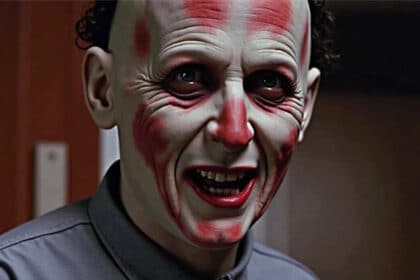Catch
We like stories about impostors because we are afraid that we ourselves are one of them

] On a cold autumn day in 1952, a Canadian destroyer Cayuga, patrolling the Yellow Sea off the coast of Incheon in South Korea, brought aboard 16 wounded soldiers. They were in serious condition as a result of participation in the Korean War. Some of them would not survive without surgical intervention. Fortunately, the ship’s doctor told the team that he is a trauma surgeon. This middle-aged middle-aged man wore a surgical gown and ordered nurses to prepare patients. Then he went to his cabin, he opened a textbook on surgery and skimmed it over. After 20 minutes, the undergraduated student Ferdinand Demara, also Jefferson Byrd Thorne, Martin Godgarth, Dr. Robert Linton French, Anthony Ingolia, Ben W. Jones, and that day – Dr. Joseph Cyrus, went to the operating theater.
“The scalpel!”
Taking a deep breath, the imposter surgeon cut the flesh. He kept in mind a simple principle: “The less you cut,” he told himself, “the less it is then sewed up.” Finding a broken rib, Demara removed it and extracted a bullet, which was near the soldier’s heart. He was afraid that the soldier would bleed, so he added a substance to the wound, “Gelfoam”, which accelerates the coagulation of blood, and it almost immediately curled. Demara returned the rib in place, patched the patient and injected that large dose of penicillin. The spectators applauded.

Pretended impostors such as Frank Abignale, whose role was played by Leonardo DiCaprio in the movie “Catch Me If You Can”, are cute to us Because they are greatly at risk, penetrating into the romantic world, the entrance to which is closed to us
During the day, Demar operated all 16 soldiers. All survived. Soon the glory of the heroism of Demar hit the newspapers. The real Dr. Joseph Cyrus, fleetingly met with Demara, read about his “own” adventures in Korea, where he really never was. The military court interrogated Demar with admiration and then dismissed the matter on brakes so as not to be disgraced.
But the story came out. After the article about Demar was made in Life magazine, the pseudo-surgeon received hundreds of letters from the fans. “We with the husband consider, that you are sent by the god”, – one woman wrote to him. One sawmill in British Columbia offered him a job as a doctor. Soon a book was written about him and a film was shot, “Great Impostor”, where this experienced actor was played by the then beginning actor Tony Curtis. Demara played the role of doctor in the film and thought about going to a medical school. But I decided that it was too difficult. “I’ve always liked the short cuts,” he said. “It’s hard to give up the habit of being an impostor.”
Pretends, these swindlers with a smile and tablet, have existed for a long time, as an attractive legacy of deception, surprising and seducing us. And although most of us hardly remain within the framework of the society, impostors break through them, without difficulty leaving any scene of their choice. Being in the center of attention, they tear off the covers from professional secrets, mocking their pretentiousness. In the depths of the soul, according to psychologists, impostors like us because, in our opinion, we ourselves to some extent pretend. Their stories haul out the kaleidoscope of our “I”, and how to cope with low self-esteem.
Professor of Psychology Matthew Hornsey began to study impostors after being deceived by a colleague from Queensland University in Australia. Elena Demidenko, who claimed about her Ukrainian roots, wrote a novel about her childhood, received a literary prize. But soon the truth was revealed: Elena Demidenko was Elena Darvil, an Australian who had nothing to do with Ukraine. Her whole story was fictitious. Being deceived and betrayed, Hornsey has since studied impostors and why people like them. “We live in a world full of obstacles,” Hornsey said. – And here you see people who take a lot of risk, penetrating into the romantic world, the entrance to which is closed to us. This is a romantic and attractive idea. ”
The impostors also manipulate our trust, the importance attached to us by uniform, the title, the business card with the inscription” Doctor of Science “. We envy the status, and we are drawn to those who love the “short ways”. We do not want our doctor to be unreal, but we are thrilled with the adventures of Frank Abignale shown in Steven Spielberg’s movie “Catch Me If You Can”, who traveled the world as a fraudster, a pretender who at the last moment escaped from justice – and everything This is even before he turned 21.
But the psychology of fraud is associated with a whole bunch of accompanying phenomena. On the one hand – impostors like Demar and Abignale. On the other hand – household pretenders, that is, we. “Most of us do a little sham everyday,” Hornsey says. “What if I smile when I’m unhappy?” What if I pretend I’m interested, when is it not? What if I pretend to be confident, but really worried? A subtle line separates the pretense from the management of impressions and social skills produced on others. ” We admire the impostors, adds Hornsey, “not because we want to be like them, but because deep down we are worried that we can be them.”
The need for pretense arises from a sense of danger. Sitting on the board of directors, in the classroom, at a high level meeting, you feel the bonds of fear telling you that you do not belong here. I do not care about your degree or resume. You’re not as smart as the others. You are an impostor. Such insecurity is sufficiently endemic to deserve a name – an impostor’s syndrome. The psychologist Pauline Clence (19459021), who came up with this term in 1978, discovered that such a syndrome is often found in successful women, but gender-independent studies have confirmed that men are equally susceptible to this syndrome, and that about 70% of professionals sometimes feel themselves impostors.
Psychologists blame the emergence of the syndrome of bipolar parenting styles. Infinite criticism in childhood can lead to the internalization of parental contempt, which then will not damp any success. Conversely, the “ideal child” syndrome, which is praised for simple drawings or designs, can also grow into doubts about whether a person’s success is deserved. Regardless of the reasons, the self-proclaimed “impostor” discovers that every achievement and every compliment only reinforces the fear that someday his “hypocrisy” will open.

] Ferdinand Demara pretended to be a doctor, monk, lawyer and teacher
The fear of pretense makes us strive for those who do not have shame and doubt while turning the most incredible deceptions. “The people love impostors,” writes British journalist Sarah Burton in her book “Pretenders: Six Types of Liars” [Imposters: Six Kinds of Liar]. We seek “openly or secretly to such violations of taboos.” As a child, we were taught that it was necessary to tell the truth, writes Burton, and “when we learn that someone has succeeded in monumental deception, our first reaction will be increased interest.”
A young man pretends to be the son of actor Sidney Poitier, Paving the way for rich houses in Manhattan. Austrian people convince people that, in spite of ignorance of the Russian language, she is the lost princess Anastasia from the Romanov dynasty. A cunning Frenchman plays over and over again the role of a long-lost orphan. Perhaps we are attracted to impostors, says Burton, because the pretender “can simply go further along the path on which we all stand.”
Psychologists attribute several motifs to serial deceivers, each of which is related to one of our internal ” I”. Some of the impostors, says Hornsey, are “unrestrained adventurers” whom we would like to become. Others try to find public support, which they lack because of shyness or alienation. Another motive is a depressed self-respect. Feeling like a loser, the impostor easily achieves a prestigious position, pretending to be someone better, someone respected. Demar did not need a psychologist to understand why he was pretending to be a doctor. “No matter how you look, Dr. Robert French was a person, good or bad,” Demara wrote. “And Demara, good or bad, no one.”
The psychologist Helen Deutsch [Helene Deutsch] believes that the impostors experienced sharp twists of fate. They were raised in successful families, but their rights were suddenly violated because of divorce, bankruptcy or betrayal. They felt deceived, and they did not have time to climb the ladder of success. They regained their status by simply seizing it. Frank Abignale left the courtroom, where his divorced parents fought for custody, and began to live fantasies. He was tall, handsome, and apparently he could have been given 26 rather than 16. He spent several years playing the role of an airline pilot, a security guard, a doctor, a lawyer. “The human’s alter ego,” he wrote in his memoirs, “is nothing more than his favorite image of himself.”
We are all pretenders on a small scale, but few of us have the intelligence or social dexterity Serial deceiver. Without a single attending course, Abignale studied law books and was tested in Louisiana. Demara could one day read a text on psychology and teach psychology to the next. Serial deceivers know how to quickly defuse the situation with a joke, and they skillfully catch the mood of listeners. “In any organization there is always a huge amount of unused resources that can be picked up without conflict with anyone,” said Demara, who pretended to be a prison guard, a professor, a monk, an assistant to the sheriff. “Make your own rules and interpretations. Nothing compares to this. Remember this and penetrate into the vacuum of power. ”
Inside us, the pretender has settled long ago. The word “person” comes from the Etruscan “Persian”, meaning “mask”. Before turning into Latin in “persona”, this term denoted the characters of Greek dramas in masks. Shakespeare used this idea in his famous “the whole world is a theater,” and we are just actors whose roles change with time and with circumstances.
We know our role. So why do we need a mask? Our inner pretender, according to psychologists, is fed from the struggle with our self-image. Every morning, looking in the mirror, we are disappointed to those who look back at us. We are just a shadow of what we wanted to become. How to live another day? To make it appear, to become a “social chameleon.”
This term, according to Mark Snyder [Mark Snyder]a professor of psychology at Minnesota University, describes those whose inner self differs from a public person. “In a sense, we are all social chameleons,” says Snyder, who studies personality and social interactions. “As a chameleon accepting the color of the physical environment, we accept the social colors of our social environment, adjusting our behavior to circumstances.”

According to Snyder, social chameleons There is usually strong self-control, they evaluate each new situation, how to fit in, how to make it like others. Self-control can be found in many professions, for example, in jurisprudence, acting, politics. But all people with good self-control, Snyder says, will agree with the statement: “I behave differently with different people.”
Philosopher Daniel Dennett [Daniel C. Dennett] compares us to fictional characters. “We sometimes invent everything, telling and repeating to ourselves the history of our life, and not truthfully enough,” he notes. Dennett believes that our inner narrator is related to the anatomy of the brain, and quotes the neuroscientist Michael Gazzanig [Michael Gazzaniga]who studied the components of the brain, each of which reacts to its stimuli. The components “have to work according to circumstances, and with amazing ingenuity, to get a small amount of behavioral unity on the way out,” Dennett writes. So, “we are all virtuoso storytellers, getting involved in all manner of behavior, and we always put on the best masks possible. We are trying to combine all our data into one good story. ”
Woody Allen brought this idea to the point of absurdity in the pseudo-documentary film” Zelig “in which a chameleon person could reincarnate depending on the group of people he was in. Leonard Zelig surprised doctors, turning into a psychiatrist with glasses, a dark-skinned jazz musician, an active Indian, and even a batter New York Yankees player. Under hypnosis Zelig explained why he does it: “To be like others is safe.”
Why does it seem so dangerous to be yourself? Maybe because the inner “I” does not exist. The German philosopher Thomas Metzinger [Thomas Metzinger]the director of the Department of Neuroethics and the MIND Group at the University of. Johann Gutenberg. “There are no personalities,” writes Metzinger in his book “Being Nobody: The Personal Model of the Theory of Subjectivity” [Being No One: The Self-Model Theory of Subjectivity]. “No one has ever had a personality and no one was.”
Metzinger believes that our minds contain only a distorted version of ourselves, a “phenomenological self” that sees the world through a window, but can not see the window. By confusing the concept of “ourselves” with the real “self,” we are trying to achieve coherence, but as a result we accept that we behave like one person on Tuesday, a slightly different version of this person on Wednesday, and God knows what awaits us for the weekend.
Metzinger says that our flimsy “self” designs are based on a central principle. “There is a fear management theory that claims that many cultural achievements are just attempts to cope with the fear that appears, the code we are conscious of our mortality,” he says. – The realization that you are dying creates a staggering conflict in our model of ourselves. Sometimes I call it a crevice or a fracture, a deep existential wound caused to us by this awareness – all my deep emotional structures say that this should not happen, and my model tells me that this should happen. ”
Our “I” is determined by our hints of mortality. It separates us from nothingness. It’s no wonder that we enjoy being inside our personalities. And now we have an ideal environment for this. MIT psychologist Sheri Turkle [Sherry Turkle]author of “The Second Self: Computers and the Human Spirit” [The Second Self: Computers and the Human Spirit] calls the social network “technology of identification”. “You can be that. You can have such friends. You can have these connections. You can have this love, this is recognition, followers, people who want to be with you, “she says. “People need this connection.” And often they become online chameleons to get it.
 And for professionals in this business, the spotlights burn brightly than ever. As the famous caricature of the New Yorker says, “no one knows that you are a dog.” Take a fictitious name, add a “Doctor of Sciences” on a self-published book, or simply write blogs, pretending to be an expert – such digital impostors thrive on the Web. You do not really believe these beautiful photos with Facebook?
And for professionals in this business, the spotlights burn brightly than ever. As the famous caricature of the New Yorker says, “no one knows that you are a dog.” Take a fictitious name, add a “Doctor of Sciences” on a self-published book, or simply write blogs, pretending to be an expert – such digital impostors thrive on the Web. You do not really believe these beautiful photos with Facebook?
Each of us is a picture of a cubist who does not have one portrait for himself. It’s no wonder that we are drawn to those who look so confident in themselves and who they are. These crafty artists offer us such self-portraits, which seem to be comparable in skill with Rembrandt. Ferdinand Demara. Frank Abigneyle. Leonard Zelig. And you? Who are you trying to deceive?









